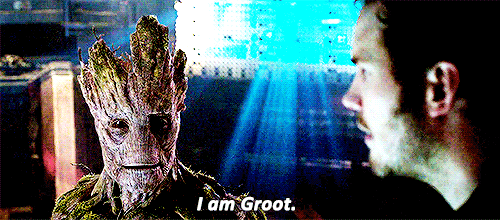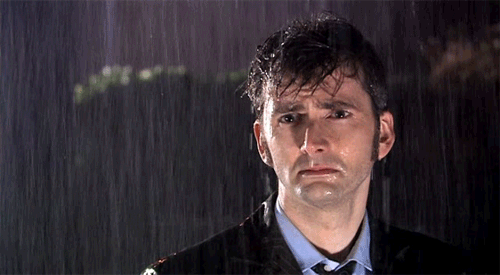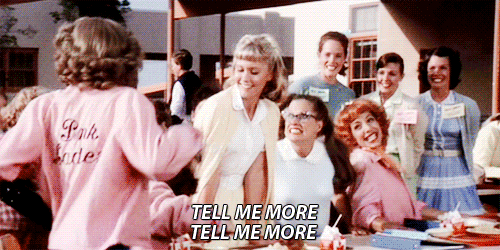I almost met Hannah Hart this week. That was almost really cool! [Ariel says: Wait, why almost? This is a situation where you need be more explicit like when Veronica Roth helpfully alerts us to metaphors running wild in the area.]
Chapter 19
Tris walks in on Peter reading the latest Erudite propaganda, because in the strongly faction-before-blood Dauntless, this is the sort of reading material that is apparently lying around. [Ariel says: You’d think this would be treated more like porn belonging to a teenager, quickly shoved under the bed and probably semen-soaked.]
“The mass exodus of the children of Abnegation leaders cannot be ignored or attributed to coincidence,” he reads. “The recent transfer of Beatrice and Caleb Prior, the children of Andrew Prior, calls into question the soundness of Abnegation’s values and teachings. […] Why else would the children of such an important man decide that the lifestyle he has set out for them is not an admirable one? […] Perhaps the answer is that we have entrusted our city to a group of proselytizing tyrants who do not know how to lead us out of poverty and into prosperity.”
Tris continues to walk the line between being a first-person narrator who uses her emotions to draw the reader into the story and one whose feelings are really just basic information.
Now the Erudite are attacking my father.

She quickly realizes that this was Molly’s revenge for their last fight, because the rules of young adult fiction state that any event taking place on a city-wide level is always caused by one of the same dozen 16-year-olds. Will pulls her away from the situation and explains a major theme of the novel to Tris, which even the characters in the story are tired of doing by this point:
That’s my family they’re talking about, that’s my faction!”
“No, it’s not.” There are dark circles under his eyes; he looks exhausted. “It’s your old faction”
They then discuss one of the considerably more perplexing major themes of the novel:
“I can’t believe my brother joined [Erudite].”
“Hey. They’re not all bad,” he says sharply.
I nod, but I don’t believe him. I can’t imagine anyone emerging from the Erudite unscathed.
Somehow in a book where the main premise is that society has been divided into five personality types, the message isn’t that people aren’t this narrowly-defined, but rather that some of those narrowly-defined people are always evil.
Christina convinces her cool friends to go to the cool tattoo place and get cool tattoos, since they’re in the cool kids group now. [Ariel says: It just wouldn’t be appealing to da ladiez if there wasn’t a makeover scene. Tris is wearing eyeliner now, so shit with Four is about to get real.] Again, somehow this book isn’t about the dangers of cliques, but how studying is bad for you.
“It’s really fascinating how [the simulation] works,” he says. “It’s basically a struggle between your thalamus, which is producing the fear, and your frontal lobe, which makes decisions. But the simulation is all in your head, so even though you feel like someone is doing it to you, it’s just you, doing it to yourself and…” He trails off. “Sorry. I sound like an Erudite.”
CASE IN GODDAMN POINT.
Anyway, hopefully you’ve lost interest in the book’s weird anti-intellectualism now, because it’s time for some young adult fiction, motherfucker!
I see Four standing by the chasm, a group of people around him. He laughs so hard he has to grab the railing for balance. Judging by the bottle in his hand and the brightness of his face, he’s intoxicated, or on his way there. I had begun to think of Four as rigid, like a soldier, and forgot that he’s also eighteen.
Obviously the most important detail here is, “Ohhhh… eighteen, you say…”

Four singles out Tris in her group of friends and very obviously hits on her. Guys, I highlighted like a page and a half of straight dialogue, because there are gems in here. Drunk flirting cliché gems:
- “You look different.” His words, normally crisp, are now sluggish. [Ariel says: I’m telling you, it’s all that eyeliner. Four likey.]
- “What are you doing?”
“Flirting with death,” he replies with a laugh. - He puts his lips next to my ear and says, “You look good, Tris.”
Four laments that he can’t invite Tris (not her friends – guys do you think he likes her???) to hang out with him, because of the only rule that Dauntless apparently follows:
“I’d ask you to hang out with us, but you’re not supposed to see me this way.” […]
“What way?” I ask. “Drunk?”
“Yeah… well, no.” His voice softens. “Real, I guess.”
Four leaves and Al literally carries Tris away, prompting Jacob Al to remind us that other people liking you can have consequences.
“What was that all about?” [Al] is trying to sound lighthearted, but he asks the question almost sadly.
Wait, I’m not sure I get it. Maybe Tris can explain a little bit more.
He still cares too much about me.
Ohhhhh it’s sad because he likes her too. Thank goodness Tris could further explain what “sadly” meant.

While in contrast, the rest of Tris’s friends are a little more:

“Yeah, I think we’d all like to know the answer to that question,” says Christina in a singsong voice. […]
“Nothing.” I shake my head. “He was drunk. […] That’s why I was grinning. It’s… funny to see him that way.”
“Right,” says Will. “Couldn’t possibly be because-”
I elbow Will hard in the ribs before he can finish his sentence.
As if to spite me for making fun of how on the nose the narration usually is, the chapter ends on this utterly befuddling Gordian Knot of false profundity:
At home I used to spend calm, pleasant nights with my family […] doing exactly what I was supposed to be doing, and everything was quiet.
I have never been carried around by a large boy, or laughed until my stomach hurt at the dinner table […] Peace is restrained; this is free.
What the shit does that mean? These contrasts are such vaguely defined concepts, one of them isn’t even defined more clearly than “this”. It’s free, which is the opposite of restrained, which is the same as peace, therefore… wait, is this an analogy of definitions, connotations, or is it conflating the two, like how the sentence is already conflating my head and my desk. [Ariel says: I just can’t stop laughing at “I have never been carried around by a large boy.” Small boys? Yes. Medium boys? Yes. But large, never large. This is free.]



Pingback: Everybody Deletes Tris’ Simulation Footage Because That Isn’t Suspicious at All: Divergent Chapter 20 | Bad Books, Good Times
“…who do not know how to lead us out of poverty and into prosperity.”
This always bugged me. They’re talking about poverty and the like, and yet they somehow have the resources to make all of these really complex serums and run likely expensive tests on all 16 year olds to see what their one defining characteristic is (which they can then choose to ignore).